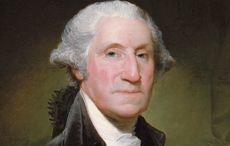| Famine memorial in Dublin |
Like a wolf in search of prey
Comes the famine on his way”
That poem in “The Nation,” the journal of the Young Irelanders, who were the Irish republicans of 1846 summarizes what was occurring as Ireland headed full tilt for the Famineand disaster.
In his new book “The Graves are Walking” John Kelly gives an extraordinary insider account of the events that led to the Famine and the machinations on high and the suffering of the peasants below.
It is still an insane thought that the most successful country in the world at the time allowed millions to starve in Ireland, its’ closest colonial neighbor.
Imagine the US, the land of plenty, allowing millions of Hawaiians to starve in a Famine there and you get some sense of the absurdity.
This book reveals insights which have rarely been glimpsed and it does not shun controversy.
The role of Daniel O’Connell as liberator of the Catholic masses is well documented.
But also documented here isO’Connell’sdisastrous decision to throw in his lot with Whig leader Lord John Russell who became Prime Minister in July 1846 at the beginning of the worst period of the Famine.
O’Connell did so to help gain the repeal of the Act of Union between Britain and Ireland, which was at the source of so many of Ireland’s problems.
But in the process he backed a man who had become a fully-fledged free trader who insisted that market prices must be received and no government intervention made – even when the result was millions of Irish starving because they could not afford to buy the imported corn.
Russell’s predecessor, the Tory leader Sir Robert Peel, as Kelly points out, had adopted a far more humane policy and had been widely praised for ordering and freeing up imported corn for starving Irish the previous year when the worst of the Famine was blunted.
Kelly has made a profound point about O’Connellthat it was the biggest mistake of his life as Russell paid no heed to repeal and the Irish starved by the millions.
The book is scathing about the various British viceroys who came over to Ireland during that period, but kind to the many incredible charities, such as the Quakers and many American organizations as well who did their best to alleviate the suffering.
There is a hilarious chapter on Monsieur Alexis Soyer, a French chef who had proclaimed he had the perfect ingredients for a gourmet soup to save the starving Irish and was much praised in The Times of London and elsewhere.
He even demonstrated this for hundreds of aristocrats in Dublin watched by a “large and brilliant assemblage” and no doubt by the starving peasants as well. Even Monty Python could not have done such a scenario justice.
M.Soyer, gourmet soup and all were soon dispatched back to Britain and obscurity.
The fate of the Famine ships is also discussed in great detail, as is the sense of impending doom in cities such as Montréal as the famine increased and the Irish boats kept coming, discharging their wretched cargo.
The scenes at Grosse Ile, the quarantine Island as depicted by Kelly would bring tears from a stone, while the unlikely rise of the Irish in New York from Famine masses to political power is also documented.
A great read if you’re Irish and even if you’re not. "The Graves Are Walking" is already deservedly a best seller in Ireland.




Comments